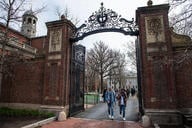You have /5 articles left.
Sign up for a free account or log in.
The house shook a little bit, but Judith Schafer, who teaches history at Tulane University waited it out. She said the storm wasn’t too bad. But then came the news that the electricity could be out for weeks. Schafer only had a week’s worth of gas for the generator. So she and her husband scooped up her 96-year-old mother-in-law and got out of dodge.
Like many faculty members who have been uprooted by Hurricane Katrina and sprinkled across the nation, Schafer headed for another university where she had contacts.
Her daughter happens to be the head of the architecture department at Ohio State University, so Schafer landed in Columbus, “without a job, or much of a life,” she said. Schafer said there has been some talk at Ohio State of offering her adjunct status, but she said she “feels loyal to Tulane,” and because Tulane is continuing to pay its faculty members, “doesn’t want to double dip and profit off the situation.” Beside the devastation to peoples’ lives, Schafer said “it breaks a historian’s heart” to think that the archives of the New Orleans public library, which contained records of “who married who, who died and why, who freed which slaves,” might be severely damaged. The library is situated at the “bottom of the soup bowl” that is New Orleans, Schafer said, and the archives are in the basement. “It would surprise me very much if it didn’t flood.”
As hurricane battered institutions put up online registries to try to find their faculty members, many migrating professors are returning to a campus where people know them. Joseph F. Wayand returned to DePauw University, where he used to be an assistant psychology professor, from Loyola University in New Orleans. Wayand is a “guest scholar,” with use of the library and other facilities, an office space, and the all important parking sticker. Wayand is not scheduled to teach at all, but in a statement online, Neal B. Abraham, DePauw’s executive vice president and dean of the faculty said, “perhaps we’ll hire him to do some part-time teaching in the spring.”
Administrators at Franklin Pierce College remembered Niyi Osundare, a Nigerian poet and professor of English from the University of New Orleans whom they gave an honorary degree in 2000. They invited him back as “visiting professor and poet-in-residence,” and he will be teaching there for the semester.
Chris Parkinson, a University of New Orleans geology professor, co-wrote a book with Juhn Liou, a Stanford University geology professor, and turned to his colleague for help. Before leaving, though, Parkinson, associate chair of his department, went around with Shea Penland , the chair of his department, hotwiring abandoned boats and picking people up from their rooftops. His house under water, Parkinson showed up at Stanford Tuesday with “just the New Orleans Fire Department shirt on his back,” his wife, and his five month old baby, according to W. Gary Ernst, professor emeritus in Stanford’s School of Earth Sciences.
Parkinson will have office space and, soon, an e-mail account at Stanford, and may give some guest talks. Stanford faculty members said it’s unclear how long Parkinson will stay before returning to the University of New Orleans, which is still paying his salary.
Laura Serpa, a professor of geology and geophysics at New Orleans, and her husband, also a UNO geology professor, are probably headed to the University of Maine as visiting faculty members. “Only until it gets cold,” Serpa said. “I’m a New Orleanian.” Serpa said her house was “at the bulls-eye” of the hurricane, but she is finding a way to stay positive. “I would rather have not lost all my possessions, but I think a lot of people in the sciences are interested in the phenomenon…there might be a picture of my house in textbooks soon to show where the waterline was,” Serpa said. She added that “as a geologist, it would be embarrassing not to have insurance for this kind of thing.”
Zhong Lin Wang, a professor of materials science and engineering at the Georgia Institute of Technology, set up two friends and former colleagues from the University of New Orleans with space to continue their nanotech research. He is working on finding lab space for five graduate students who work with the displaced professors. “I asked them what equipment they need, and I looked around, and I have most of it,” Wang said. He added that he contacted the National Science Foundation to see if there might be grants available for joint projects with the displaced researchers and grad students. “They said they will try to develop internal procedures to expedite the process,” Wang said. Right now, the faculty members from New Orleans have no formal relationship with Georgia Tech, but they may be given visiting professor roles. The students will enroll full time, and see how things are going after a semester.
Other graduate students from New Orleans probably will not return. Seven geology students, five of them graduate students, crashed with Matthew and Iris Totten, geology faculty members who left the University of New Orleans for Kansas State University weeks before Katrina. The Tottens got in touch with their former students, and they are now enrolled full time at Kansas State, with no intention of returning. Iris Totten said New Orleans faculty members encouraged her to help the students avoid a break in their education. “I wanted to check with them, because I didn’t want to be stealing,” Totten said.
Robert Chasner, dean of the graduate school and vice chancellor of research at UNO, said he was pleased that graduate students and faculty members were finding temporary homes elsewhere. He stressed, however, that UNO would continue to pay them, and hoped they would return next semester. "Many of our most stellar research faculty have assured me that they are staying at UNO, he said. "You can imagine how good that made me feel."




